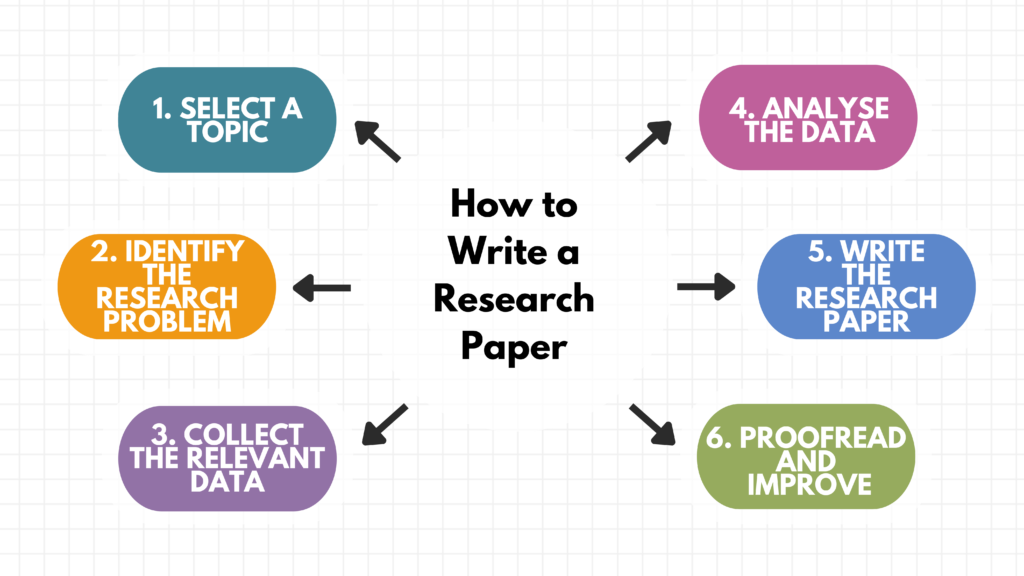How to Write a Research Paper

Composing a research paper might be a difficult undertaking, but it’s a crucial skill for academic success. Whether you’re a high school student tackling your first research paper or a college student looking to improve your writing, understanding the process is key. This guide will take you through every step of the research paper writing process, from selecting a topic to completing your final draft. By the end, you’ll be equipped with the tools and knowledge to craft a well-organized, thoroughly researched paper that stands out.
Understanding the Assignment
Before you even begin researching or writing, it’s essential to fully understand the assignment. What are your instructor’s expectations? Are there particular guidelines concerning length, format, or types of sources? Understanding these criteria at the outset will help you avoid wasting time and experiencing frustration later on.
Once you’re clear on the requirements, the next step is choosing a research topic. This can be one of the most difficult aspects of the process. Your topic should be both interesting to you and feasible within the scope of the assignment. Strive for a middle ground between a subject that offers a wealth of information and one that is focused enough to be easily handled.
Conducting Preliminary Research
With a specific topic in mind, we can now initiate our preliminary investigation. This initial stage is about exploring what’s already out there on your chosen subject. Make use of trustworthy resources including books, scholarly publications, and trustworthy websites. Creating a research question or thesis statement that will direct the remainder of your study should also be done at this point. Your research paper’s thesis statement should serve as a clear, succinct, and detailed guide.
Creating a Research Plan
Now that you have a clear direction, it’s time to create a study plan. Creating a research plan involves setting a timeline for each stage of the process, from gathering sources to drafting sections of your paper. This approach will help you stay on track and fulfill your commitments on time. Divide the writing and research process into small, doable tasks and set out definite time windows for each. This organized approach will make the entire process less overwhelming.
Drafting an Outline
Your research paper’s outline serves as its framework. It helps you arrange your ideas and makes sure that your work makes sense. Start by outlining the main sections of your paper: introduction, body, and conclusion. Within each section, list the key points you want to cover. Your outline should also include sub-points and any supporting evidence you’ll use. This step is crucial as it serves as a blueprint for your research paper, helping you to stay focused and organized as you write.
Writing the Introduction
The tone of the entire paper is established in your beginning. It should introduce your thesis statement succinctly, give some history, and draw the reader in. To grab the reader’s attention, begin with an intriguing hook, such as a question, a quote, or an intriguing fact. Then, give some context for your research, explaining why the topic is important and what gap in knowledge your paper aims to fill. Lastly, present your thesis statement, which will serve as the paper’s main point of reference.
Developing the Body of the Paper
Your research paper’s body is where you should put your ideas, supporting details, and analysis. Every paragraph ought to concentrate on a single idea, and every idea ought to bolster your thesis statement. Use evidence from your research to back up each point, integrating sources smoothly into your writing. It’s essential to maintain a logical flow throughout your paper, using transitions to connect ideas and ensure that the reader can follow your argument.
Writing the Literature Review
A vital part of many research articles is a literature review. It involves summarizing and synthesizing previous research on your topic. Your research should be contextualized and shown to add to the body of knowledge already in existence. When writing your literature review, focus on identifying trends, gaps, and controversies in the research. This will assist you in placing your paper in the context of a larger scholarly discussion.
Presenting Your Research Methodology
You will describe the techniques you employed to carry out your research in this part. Whether you performed experiments, conducted surveys, or analysed existing data, it’s essential to justify your methodological choices. Describe the steps you took in enough detail that another researcher could replicate your study. This openness gives your research more legitimacy and enables others to evaluate the reliability of your conclusions.
Analysing and Interpreting Data
After presenting your data, the next step is to analyse and interpret it. This section is where you discuss what your findings mean in the context of your research question or thesis statement. Use charts, graphs, and tables to present your data clearly, and interpret the results, explaining their significance. It’s also important to discuss any unexpected findings and consider alternative explanations.
Writing the Discussion Section
The discussion section is where you compare your results with your expectations and with the findings of other researchers. Discuss the consequences of your findings, taking into account how they add to the body of information already available on the subject. Talk about the study’s shortcomings as well as potential directions for further investigation. This section should tie together your findings with the broader academic context, reinforcing the importance of your research.
Crafting the Conclusion
Summarize the main ideas covered in your research report in your conclusion. In light of the facts you’ve provided, restate your thesis and emphasize the key findings. You should also make recommendations for future study directions or real-world applications of your work in your conclusion. Finish with a powerful thesis statement that captures the reader’s attention and stays with them.
Citing Sources Properly
Citations should be used correctly in academic writing. It assists you in avoiding plagiarism in addition to providing acknowledgment to the original writers. Learn the needed citation style for your paper, be it Chicago, MLA, APA, or another format, and make sure you adhere to it consistently throughout your work. Use citation tools to keep track of your sources, and double-check your bibliography before submitting your paper.
Revising and Editing
It’s time to edit and rewrite your manuscript after you’ve finished it. Examining the large picture while revising entails making sure your work is coherently structured, your arguments are convincing, and your supporting details are apparent. Editing focuses on smaller details, such as grammar, punctuation, and style. Don’t be afraid to make substantial changes during the revision process; it’s an opportunity to improve your paper significantly. Finally, proofread your work to catch any remaining errors.
Finalizing Your Research Paper
Before you submit your research paper, make sure it’s properly formatted and polished. Make sure your paper satisfies all the requirements by checking the guidelines provided by the publisher or your instructor. Pay attention to details like font size, margins, and page numbering. A well-presented paper not only looks professional but also makes a positive impression on your reader.
Composing a research paper is a demanding yet worthwhile undertaking. You may develop a well-structured, extensively researched paper that highlights your academic abilities by adhering to these procedures. Remember, the key to success is planning ahead, staying organized, and being meticulous in your research and writing. With practice, you’ll find that writing research papers becomes a more manageable and even enjoyable task.
Reach out to us at www.saairatechnologies.com or give us a call at 7604897174 if you need assistance with the journal paper revision of your research.
FAQ
Most frequent questions and answers
The length of a research paper varies depending on the assignment or publication requirements. Generally, academic papers range from 5 to 20 pages, but it’s essential to follow any specific guidelines provided.
Common mistakes include choosing a too broad or too narrow topic, failing to properly cite sources, and not following the required format. Poor organization and lack of a clear thesis are also frequent issues.
Select a subject that both piques your curiosity and is pertinent to your area of study. Make sure the issue is manageable enough to be narrow, but also that there is sufficient prior research to support your work.
To arrange your sources, use citation management software such as Mendeley, EndNote, or Zotero. These tools help you keep track of your references and format citations correctly.
Our strengths
Guarantee of Service
PhD in Creativity
At Saaira Technologies, our mission is to provide a level of service unparalleled by any other organization. We take immense pride in our team of highly skilled and experienced pro-writers. We are excited to declare that, at Saaira Technologies, we never compromise when it comes to quality. Our commitment to excellence sets us apart in the industry.
Assurance and Privacy
At Saaira Technologies, we guarantee that your research and personal information will be treated with utmost confidentiality. We are committed to maintaining strict privacy and ensuring that your data is securely handled for internal purposes only. Your trust is of paramount importance to us, and we take every measure to safeguard your information.
24/7 Service Assistant
At Saaira Technologies, our team of experts is readily available round the clock on Facebook, WhatsApp, and Email, ensuring uninterrupted support and assistance. We operate 24 hours a day, 7 days a week, allowing clients to conveniently connect with us at any time. Your satisfaction is our priority, and we are committed to providing timely and reliable service.
Why choose us?
PhD help technical experts are very friendly and always ready to hear from you. Our experts are available at any stage of your PhD work.
The project you submit to us will be a hidden treasure and it will be confidential and maintained very secretly.
PhD help projects are always cost effective but we assure you that this will not affect the quality of your work.
PhD help developers are well experienced and professionals in their particular field. They are very eager and always on duty. They are readily available to help you in any situation and time. Our experts are available on the shop floor always ready to help you at any point of your PhD you are stuck.
Teams of Saaira Technologies
Business Development Executives


Data Scientist
Language Editing Division


Department of Journal Publications
What Sets Us Apart from The Competition?

